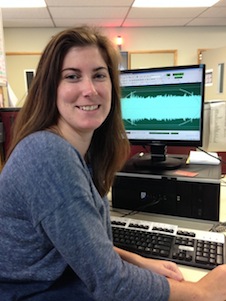
Kate Newton
BA (Honours) English
Journalist, Radio New Zealand
Kate Newton knew she wanted to be a journalist by the end of High School. “I loved following politics and current affairs and also wanted to end up doing something that allowed me to write for a living.”
Kate chose to study English to prepare herself for her chosen career. “Studying English encouraged me to look at the world through endless lenses, windows and perspectives I didn't even know existed. The degree not only gave me fantastic communication and analytical skills - it taught me the importance of sitting back and listening to another person's story.”
In her final year of University, Kate applied for the Fairfax internship scheme and was offered a place by The Dominion Post. During her year of journalism school at Massey in Wellington, Kate interned at The Dominion Post and was offered a permanent job there once she finished.
In 2013, Kate took up a position in the Auckland newsroom of Radio New Zealand. “There seems to be no end to the variety of human experience I get to witness - whether it's reporting on the Kim Dotcom legal saga, the arrival and settlement of Afghan interpreters who worked for New Zealand's defence force in Bamiyan province...or the Hyde Street keg party.”
Kate notes that her “Honours year was especially rewarding. To get to spend a year working on an original piece of research, surrounded by a tight-knit group of people all doing the same thing, was such a privilege. The small class sizes and knowing that everyone there was as interested as I was meant tutorials become engaging conversations, and I really felt like I was part of the department. I'm so proud of what I achieved in honours. I still have a copy of my dissertation, and sometimes think - did I write that?”
Kate found English helped her with journalism by driving home the power of the written or spoken word. “I think it's really important, as a journalist, to never lose sight of the potential impact of what you're writing, and how you're writing it – you have to remember there's a reader or listener or watcher at the other end whose view of what's happening in the world may be shaped, in part, by what you're doing. Literature and drama are not so different from journalism in that way.”